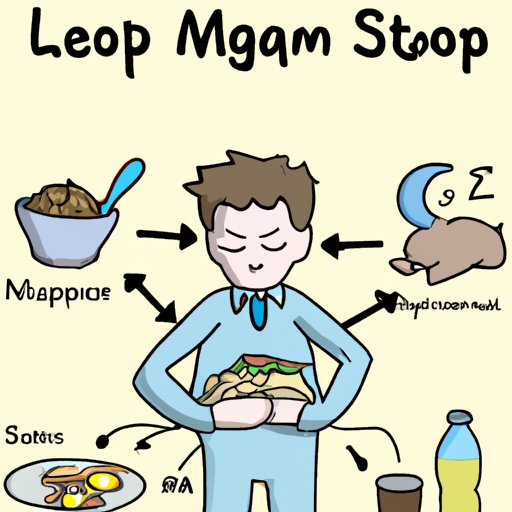Introduction
Sleeping after eating is a common practice that many people take part in. But is it really bad for you? In this article, we’ll explore the potential pros and cons of sleeping after eating, looking at how it affects digestion and metabolism, as well as its impact on hormones related to sleep. We’ll also provide tips for improving sleep quality.

Unpacking the Science Behind Eating and Sleeping
Before we dive into the potential effects of sleeping after eating, let’s first look at the science behind how food affects our bodies. The digestive process begins with the act of eating, which triggers the release of saliva, enzymes, and gastric juices that help break down the food. Once broken down, the food moves through the intestines and is absorbed into the bloodstream. From here, the nutrients are distributed throughout the body to be used for energy and other bodily functions.
When it comes to the relationship between food and sleep, it’s important to note that certain foods can have an effect on our sleep patterns. For example, certain foods that are high in sugar or caffeine can cause alertness and interfere with our ability to fall asleep. On the other hand, foods that are high in tryptophan—an amino acid found in dairy products, eggs, fish, and poultry—can promote sleepiness.
How After-Meal Sleep Affects Your Health
Eating right before bedtime has been linked to several health issues, including weight gain and metabolic disorders. This is because when we eat late at night, our bodies are not able to efficiently digest and process the food due to the lack of activity. As a result, the food is stored as fat instead of being used for energy.
In addition, sleeping after eating can affect the production of certain hormones, such as leptin and ghrelin. Leptin is responsible for regulating hunger and satiety levels, while ghrelin is responsible for stimulating appetite. When we sleep after eating, these hormones become disrupted, leading to increased hunger and cravings.
Examining the Link Between Eating and Sleep
When we eat, our bodies produce hormones that affect our sleep patterns. For example, insulin helps to regulate blood sugar levels, while serotonin helps to regulate mood and sleep. These hormones interact with the foods we eat, so certain foods can cause an increase or decrease in their production.
In addition, certain hormones—such as melatonin and cortisol—are directly related to our sleep cycles. Melatonin is released in response to darkness, while cortisol is released in response to stress. Eating late at night can disrupt the production of these hormones, making it harder to fall asleep or stay asleep.

The Pros and Cons of Sleeping After Eating
Now that we’ve looked at the science behind eating and sleeping, let’s explore the potential pros and cons of sleeping after eating. On the one hand, sleeping after eating can help to relax the body and mind, allowing for better sleep quality. Additionally, it can prevent overeating by giving your body time to digest the food before you eat more.
On the other hand, sleeping after eating can lead to weight gain and metabolic disorders. It can also disrupt the production of hormones related to sleep, making it harder to fall asleep or stay asleep. Furthermore, sleeping after eating can lead to indigestion and heartburn.
Exploring the Impact of Post-Meal Sleep on Digestion
When we sleep after eating, it can slow down the digestion process, as our bodies are not able to efficiently break down the food. This can lead to indigestion, bloating, and other gastrointestinal issues. Additionally, sleeping after eating can lead to an increase in the production of stomach acid, which can cause further discomfort.
Investigating the Effects of Post-Meal Napping
Napping after meals can be beneficial in some cases, as it can help to reduce fatigue and improve alertness. However, it’s important to note that napping for too long can lead to sleep inertia, which is a feeling of grogginess and disorientation upon waking up. It’s best to limit naps to 20 minutes or less in order to avoid this effect.

Shedding Light on the Relationship Between Food and Sleep
Overall, it’s clear that there is a complex relationship between food and sleep. While sleeping after eating can have both benefits and drawbacks, it’s important to pay attention to how your body reacts to different types of food. If you’re having trouble falling asleep or staying asleep, it may be helpful to avoid eating late at night or consuming foods that are high in sugar or caffeine.
In addition, there are several practical tips for improving sleep quality, such as avoiding screens before bed, sticking to a consistent sleep schedule, and exercising regularly. Taking steps to optimize your sleep environment can also help to create a more conducive space for restful sleep.
Conclusion
In conclusion, sleeping after eating can have both positive and negative effects on our health. While it can help to relax the body and mind, it can also lead to weight gain and metabolic disorders. Additionally, it can disrupt the production of hormones related to sleep. It’s important to pay attention to how your body responds to different types of food, and to take steps to optimize your sleep environment for better rest.
We hope this article has shed light on the complex relationship between food and sleep. For more information, we suggest reading up on the latest research and speaking to a healthcare professional about any questions or concerns you may have.


